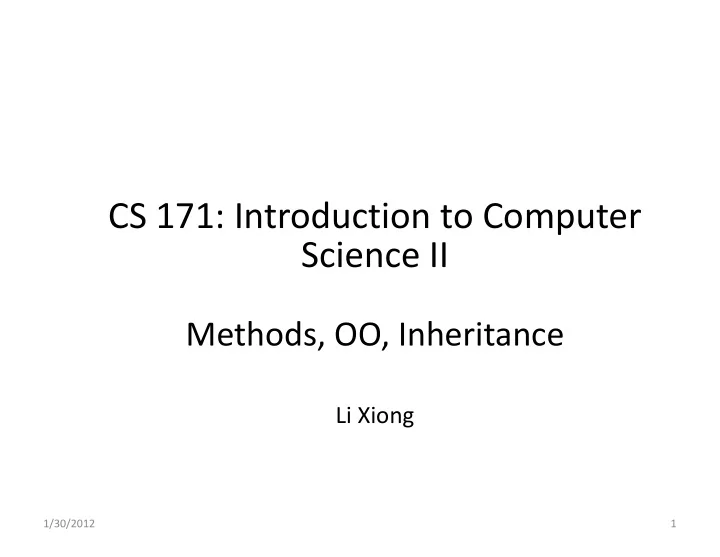

CS 171: Introduction to Computer Science II Methods, OO, Inheritance Li Xiong 1/30/2012 1
Announcement � Eclipse/debugging lab � 1/30, Monday, 5-6pm, E308 � Hw1 � To be assigned 1/31, Tuesday � To be assigned 1/31, Tuesday � Due 2/7, Tuesday
Roadmap � Review � Types, variables, expressions � Control flows � Methods � OO and Inheritance � Next lecture � Arrays and binary search 1/30/2012 3
Defining and Using Methods � Define a method – give a definition of what the method is to do ������������������� �������������������������������� ������������������������� � � Call or invoke a method – use a method ������������������������������ 4
Passing Parameters � ���������������������������������������������������� ������������������������������������������������ � ����������������������������������������������������� ����������������������������������������������������� ����������������������������������������������������� ���������������������������������� ��������������� 5
Mechanics of the Method-Calling Process 1. Evaluate the argument expressions 2. Copy argument value into the corresponding parameter, (allocated in a newly assigned region of memory called a stack frame ) 3. Execute body, using the new stack frame for local 3. Execute body, using the new stack frame for local variables. 4. On a ������ statement, compute the return value and substitutes that value in place of the call. 5. Discard the stack frame for the method and returns to the caller, continuing where it left off.
Sum Example: Call Stack public static void main(String[] args) { // 1. evaluate arguments System. out.println("sum(1, 10) is: " + sum(1, 10) ); // 1+2+...+10 System. out.println("sum(25, 30) is: " + sum(25, 30) ); //25+26+...+30 System. out.println("sum(40, 50) is: " + sum(40, 50) ); //40+41+...+50 } public static int sum(int start, int end) { // 2. copy args, new SF int sum = 0; for (int i = start ; i <= end ; i++) { // 3. execute the body sum += i; } return sum ; //4. return the value, and discard stack frame } 7
Trace Method Invocation � ����������������������������������������� ��������������������%��������+&��������#���� �������� �!�� �������������� ������"� �#�� � ������$� ���%��&�"��� ���������+�,����#�� ��� ����������� ����+�� ��������'���'��������� ������� ���(������%��������)����(�*���*� ���(������%��������)����(�*���*� ����������� ����#�� ����������� ����#�� ���(�����(�*�"�*�(����(�*�$��� � � � ����������������� � � 8
Overloading Methods ����������������� ��%���� ���+&���� ���#���� �������+�,����#� ����������+� ���� ����������#� � �����������������������%�����������+&�����������#���� �������+�,����#� �������+�,����#� ����������+� ���� ����������#� � ��%�+&�-�� ��%�+'.&�-'.�� ��%�+'.&�-�� 9
Overloading Methods ����������������� ��%���� ���+&���� ���#���� �������+�,����#� ����������+� ���� ����������#� � �����������������������%�����������+&�����������#���� �������+�,����#� �������+�,����#� ����������+� ���� ����������#� � ��%�+&�-�� ��%�+'.&�-'.�� ��%�+'.&�-�� 10
Overloading methods � Method overloading: multiple methods can have the same name but different parameter lists � Compiler determines which method is used based on the method signature (method based on the method signature (method name and parameters) � Early binding
Roadmap � Java Review � Types, variables, assignments, expressions � Control flow statements � Methods � OO and Inheritance 1/30/2012 12
Objects and Classes � Object: entity that you can manipulate in your programs � Data fields: state of an object � Methods: instructions that accesses or modifies the object � Class: construct that defines objects of the same � Class: construct that defines objects of the same type (set of objects with the same behaviour) � Definition of data fields: properties of defined objects � Definition of methods: behaviours of defined objects � Constructors are special type of methods used to construct and initialize objects from the class
Example �������������/�������� � ���������������������00��������������������� �������/�������������������������� ����� �������/������������������ �(1�$��)�(��� ���������������������������������������� ���������������������������������������� ���������������������������������������� � �������������/������������� � ���������������������������������������� /���������� ���)�/��������2����3����/�������4�� ������'���'����������� � � 14
Have you heard about the object-oriented way to become wealthy? 15
Inheritance � Different types of employees � Hourly employee � Salaried employee � Volunteer � Volunteer � What features are common for all employees? � What features are specific? 16
Inheritance � What features are common for all the shapes? � What features are specific to: � Triangle? � Circle? � Rectangle 17
Inheritance - idea ��������������� ����� �������� �������� ������ �������� ����!����� ������ "���� ������ 18
�%����� keyword � Use extends keyword to tell that one class inherits from other class �������������5��������6�"����� �������7����������� �����������������8������ � �������������7�������%������5��������6�"����� ��������������������� � 19
Inheritance � A subclass inherits all fields and methods from the superclass � A subclass can also: � Add new fields � Add new methods � Add new methods � Override the methods of the superclass � Superclass’s constructor are not inherited � Unlike fields and methods � They are invoked explicitly or implicitly 20
Using the Keyword super � ����� refers to the superclass � This keyword can be used in few ways: � To call a superclass constructor � To call a superclass method � To access a superclass public data field � To access a superclass public data field 21
Recommend
More recommend